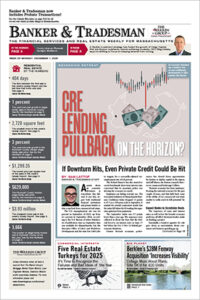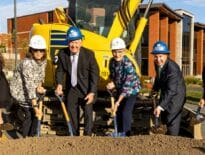
A U.S. Navy hospitalman prepares a dose of the COVID-19 vaccine to be administered to a patient at Walter Reed National Military Medical Center in Bethesda, Maryland, in this December 2020 file photo. Photo by Lisa Ferdinando | Department of Defense
As the White House on Thursday set a deadline for large private employers to establish a vaccine-or-testing mandate for workers, a new survey of Boston-area employers found vaccine mandates to be popular among executives and managers.
The survey of Boston business leaders showed that 77 percent would prefer to work at a company that had a vaccine mandate for employees, with 34 percent preferring to see that mandate paired with a masking requirement while in the office.
Nearly three-quarters of those queried, or 73 percent, also said they would be less likely to want to collaborate in person with the colleague they most respected in the office if they learned that person was not vaccinated, compared with just 23 percent who said it would have no impact.
The survey was conducted by the Boston Business Journal and Seven Letter, a Washington-based communications firm with offices in Boston. A total of 402 business leaders were surveyed, including 36 percent of respondents who identified as owners, CEOs or C-level executives and another 32 percent who identified as a vice president, senior director or director in their company.
The figures were released the same day President Joe Biden announced that Jan. 4 would be the deadline for private-sector employers with at least 100 employees to establish a mandate requiring all employees to be either vaccinated against COVID-19, or submit to weekly testing and wear a mask at work.
Biden initially rolled out the policy in September, and the Occupational Safety and Health Administration on Thursday said it would be issuing the official rule covering 84 million American workers.
The White House said the Centers for Medicare & Medicaid Services would also be issuing a rule requiring health care workers at facilities participating in Medicare and Medicaid to be fully vaccinated by the same date. The CMS rule would cover more than 17 million workers at approximately 76,000 health care facilities around the country, according to the Biden administration.
Many major Boston-area employers, including Mass General Brigham, Beth Israel Lahey Health, UMass Memorial Health and Wellforce, and numerous colleges, universities and other companies, have already implemented vaccine mandates for workers as they have reopened offices.
Gov. Charlie Baker has also required vaccination for more than 42,000 executive branch employees, achieving a compliance rate of about 95 percent, with more than 2,000 waiting for a ruling on their request for a health or religious exemption.
The Baker administration’s vaccine mandate extends to long-term care providers and home care workers.
Asked about ways the state might be able to help companies come into compliance, Baker said Thursday he thought the federal government had gotten much more “serious and aggressive about appreciating the value and importance of rapid tests,” and expects “significant resources” to be available this fall for both employers and families.
“They’ve been proven in Europe and in the U.S. to be enormously effective at helping people deal with this question about, ‘Do I have COVID?’, every single day and I’m looking forward to having a much bigger collection of choices and options for people associated with those test kits shortly,” Baker said.
The BBJ-Seven Letter survey found that 78 percent of the business leaders would feel more safe at work with a vaccine mandate, compared to 64 percent who said the same thing about a mask mandate. Sixty-five percent said a vaccine mandate would make them feel “much more safe,” which was higher than masks, social distancing or even an active shooter protocol or fire escape plan.
A total of 72 percent said they would prefer a COVID-19 vaccine mandate to casual Fridays.
“The intensity of the support felt for mandates amongst this population is overwhelming, and, according to our data, that could translate into fewer opportunities for collaboration between unvaccinated and vaccinated team members,” said pollster Matt George, a Seven Letter partner and head of research.
U.S. Secretary of Labor Marty Walsh and White House COVID-19 Response Coordinator Jeff Zients wrote an op-ed in Thursday’s USA Today arguing that a full economic recovery in the United States will continue to be held back until more people are vaccinated.
The White House said about 70 percent of American adults are vaccinated, and children age 5 and older are now eligible for shots.
“Thousands of employers have already stepped up, and a large body of data overwhelmingly demonstrates that organizations that have implemented COVID-19 vaccination policies to protect their workers have increased vaccination rates by more than 20 percentage points to well above 90 percent,” Walsh and Zients wrote.
The two officials said a “strong majority” of Americans support employer vaccination policies, and that mandates could lead to up to 5 million Americans reentering the workforce.
Before becoming a state lawmaker and then mayor of Boston, Walsh worked in organized labor as a union leader in Boston and said he understands the pressures on labor and management. In Massachusetts, pushback on vaccine mandates has come from unions representing law enforcement.
“We know managing change can be hard. But there’s no question: COVID-19 presents a grave threat to worker safety, and this emergency rule is the best way to prevent death and serious illness from work-related transmissions,” Walsh and Zients wrote in USA Today. “American employers have an opportunity to save lives, strengthen our economy, and accelerate the end of this pandemic. It’s time for all employers to step up and do their part.”






